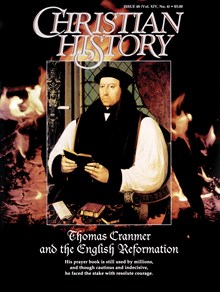



In addition to the full archives of Christian History, CT subscribers also receive:
Already a CT subscriber? Log in
April 19, 526: Justinian I is crowned Roman Emperor in Constantinople's magnificent cathedral, the Santa Sophia. Attempting to restore political and religious unity in the eastern and western empires, he ruthlessly attacked pagans and heretics and created the Code of Justinian, a massive restructuring of law (including much regarding the relationship of church and state) that would be the basis of legislation for nearly a millennium.
April 19, 1054: Pope Leo IX dies. Because Leo refused the title ...
